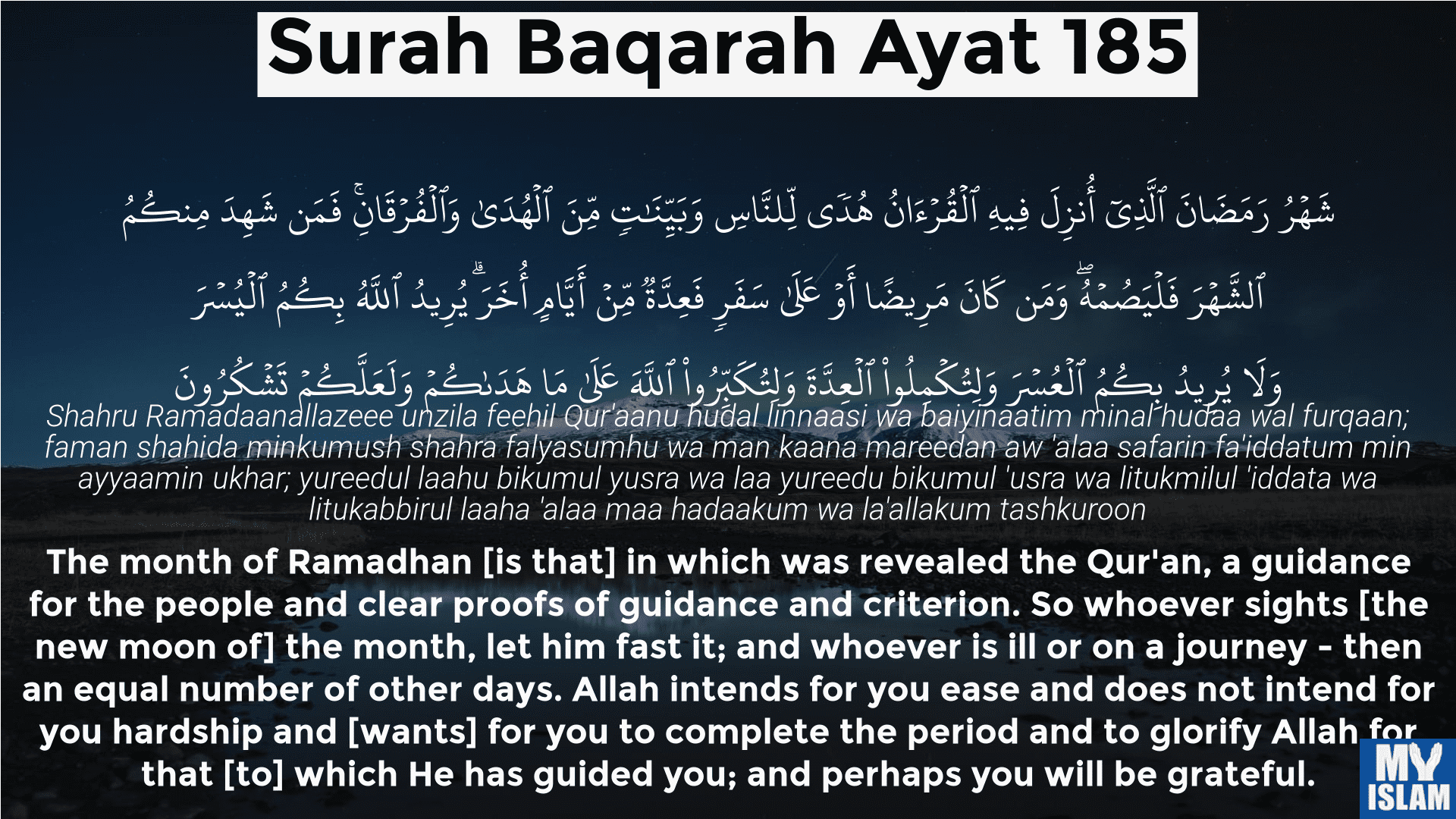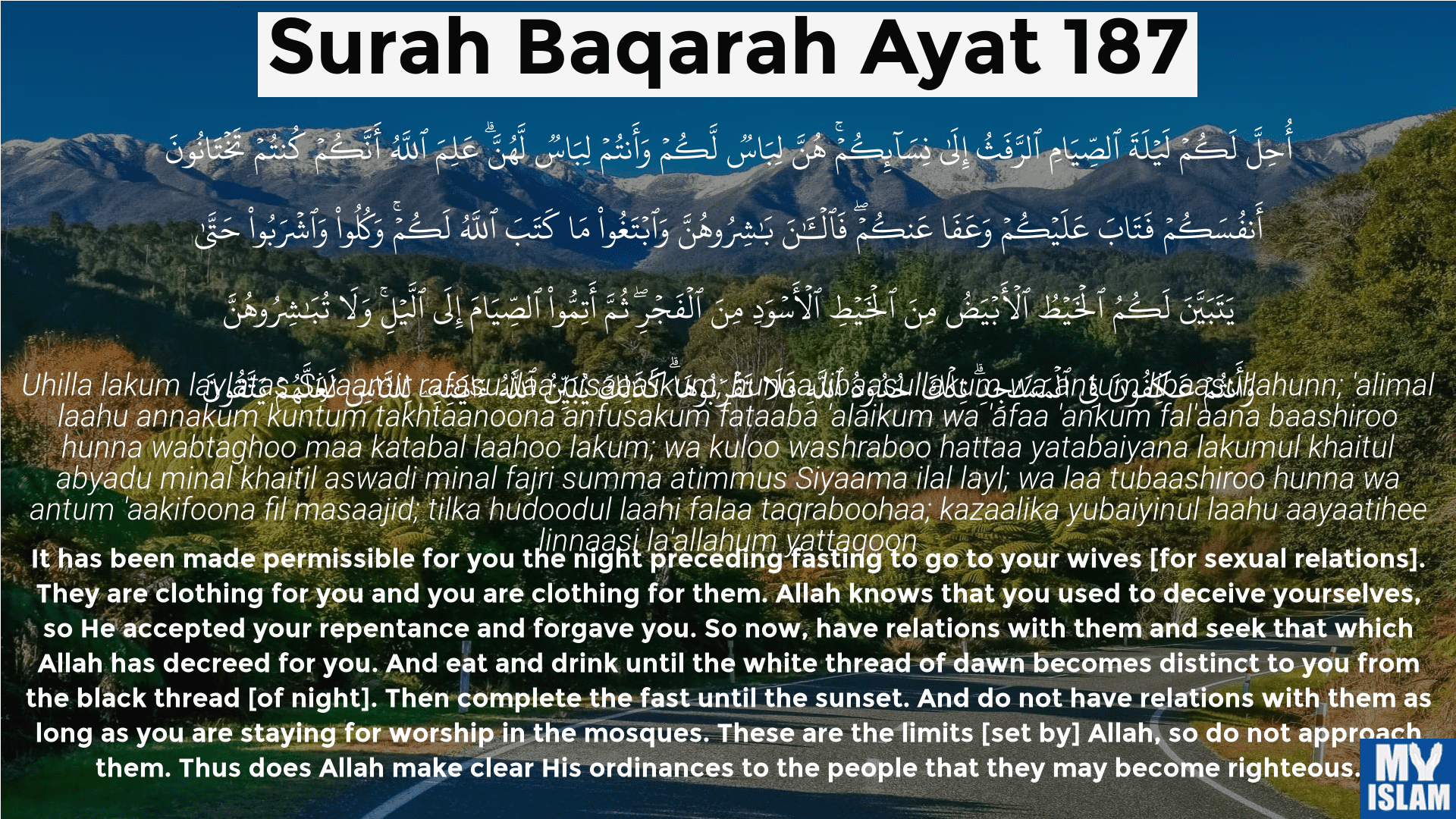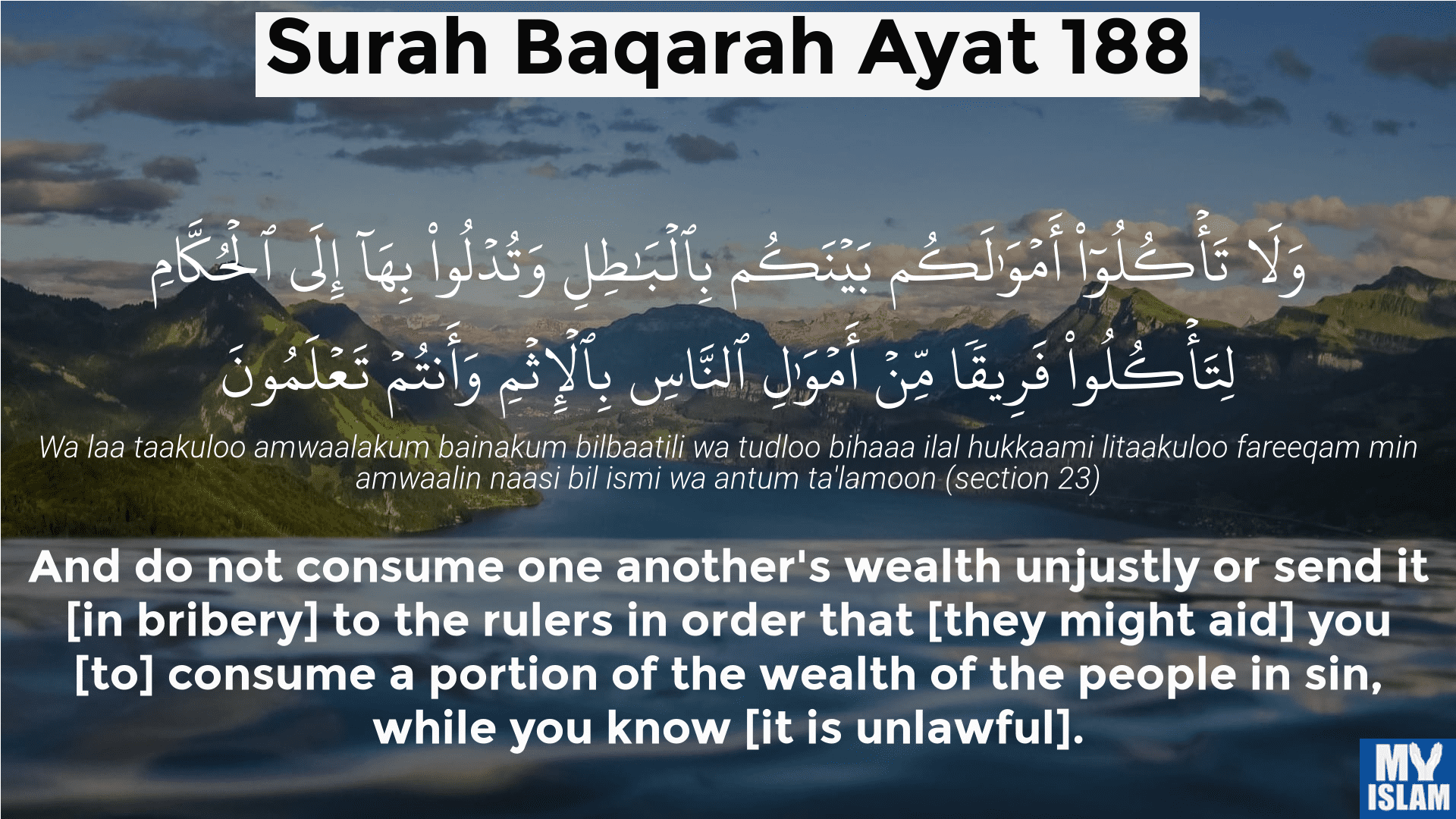Surah Baqarah Ayat 185 in Arabic Text
English Translation
Here you can read various translations of verse 185
The month of Ramadhan [is that] in which was revealed the Qur’an, a guidance for the people and clear proofs of guidance and criterion. So whoever sights [the new moon of] the month, let him fast it; and whoever is ill or on a journey – then an equal number of other days. Allah intends for you ease and does not intend for you hardship and [wants] for you to complete the period and to glorify Allah for that [to] which He has guided you; and perhaps you will be grateful.
“Ramadhan is the (month) in which was sent down the Qur’an, as a guide to mankind, also clear (Signs) for guidance and judgment (Between right and wrong). So every one of you who is present (at his home) during that month should spend it in fasting, but if any one is ill, or on a journey, the prescribed period (Should be made up) by days later. Allah intends every facility for you; He does not want to put to difficulties. (He wants you) to complete the prescribed period, and to glorify Him in that He has guided you; and perchance ye shall be grateful.
Ramadan is the month in which the Qur’an was sent down: this Book is a perfect guidance for mankind and consists of clear teachings which show the right way and are a criterion of Truth and falsehood. Therefore from now on whoever witnesses it, it is obligatory on hire to fast the whole month, but if one be ill or on a journey, he should make up for the same number by fasting on other days. Allah desires to show leniency to you and does not desire to show any hardship. “therefore this method is being shown to you so that you may complete the number of Fast days and glorify Allah for the Guidance He has shown to you and be grateful to Him.
The month of Ramadan in which was revealed the Quran, a guidance for mankind and clear proofs for the guidance and the criterion (between right and wrong). So whoever of you sights (the crescent on the first night of) the month (of Ramadan i.e. is present at his home), he must observe Saum (fasts) that month, and whoever is ill or on a journey, the same number [of days which one did not observe Saum (fasts) must be made up] from other days. Allah intends for you ease, and He does not want to make things difficult for you. (He wants that you) must complete the same number (of days), and that you must magnify Allah [i.e. to say Takbir (Allahu-Akbar; Allah is the Most Great) on seeing the crescent of the months of Ramadan and Shawwal] for having guided you so that you may be grateful to Him.
The month of Ramadan in which was revealed the Qur’an, a guidance for mankind, and clear proofs of the guidance, and the Criterion (of right and wrong). And whosoever of you is present, let him fast the month, and whosoever of you is sick or on a journey, (let him fast the same) number of other days. Allah desireth for you ease; He desireth not hardship for you; and (He desireth) that ye should complete the period, and that ye should magnify Allah for having guided you, and that peradventure ye may be thankful.
The month of Ramadan (is the month) in which the Qur’an All-Supreme Reading) was sent down: a guidance to mankind, and supreme evidences of the guidance and the all-distinctiveCriterion; So, whoever of you is present (Literally: witnesses the month) at the month, then he should fast it; and whoever is sick or on a journey, then a (fixed) number of other days. Allah wills for you ease, and He does not will difficulty for you (He wills) and that you should complete the (fixed) number. And magnify Allah for having guided you, and that possibly you would thank (Him).
It was in the month of Ramadan that the Quran was revealed as guidance for mankind, clear messages giving guidance and distinguishing between right and wrong. So any one of you who is present that month should fast, and anyone who is ill or on a journey should make up for the lost days by fasting on other days later. God wants ease for you, not hardship. He wants you to complete the prescribed period and to glorify Him for having guided you, so that you may be thankful.
ماه رمضان وه ہے جس میں قرآن اتارا گیا جو لوگوں کو ہدایت کرنے واﻻ ہے اور جس میں ہدایت کی اور حق وباطل کی تمیز کی نشانیاں ہیں، تم میں سے جو شخص اس مہینہ کو پائے اسے روزه رکھنا چاہئے، ہاں جو بیمار ہو یا مسافر ہو اسے دوسرے دنوں میں یہ گنتی پوری کرنی چاہئے، اللہ تعالیٰ کا اراده تمہارے ساتھ آسانی کا ہے، سختی کا نہیں، وه چاہتا ہے کہ تم گنتی پوری کرلو اور اللہ تعالیٰ کی دی ہوئی ہدایت پر اس کی بڑائیاں بیان کرو اور اس کا شکر کرو
Quran 2 Verse 185 Explanation
For those looking for commentary to help with the understanding of Surah Baqarah ayat 185, we’ve provided two Tafseer works below. The first is the tafseer of Abul Ala Maududi, the second is of Ibn Kathir.
Ala-Maududi
(2:185) During the month of Ramadan the Qur’an was sent down as a guidance to the people with Clear Signs of the true guidance and as the Criterion (between right and wrong). So those of you who live to see that month should fast it, and whoever is sick or on a journey should fast the same number of other days instead. Allah wants ease and not hardship for you so that you may complete the number of days required,[186] magnify Allah for what He has guided you to, and give thanks to Him.[187]
186. Whether a person should or should not fast while on a journey is left to individual discretion. We find that among the Companions who accompanied the Prophet on journeys some fasted whereas others did not; none objected to the conduct of another. The Prophet himself did not always fast when travelling. On one journey a person was so overwhelmed by hunger that he collapsed; the Prophet disapproved when he learned that the man had been fasting. During wars the Prophet used to prevent people from fasting so that they would not lack energy for the fight. It has been reported by ‘Umar that two military expeditions took place in the month of Ramadan. The first was the Battle of Badr and the second the conquest of Makka. On both occasions the Companions abstained from fasting, and, according to Ibn ‘Umar, on the occasion of the conquest of Makka the Prophet proclaimed that people should not fast since it was a day of fighting. In other Traditions the Prophet is reported to have said that people should not fast when they had drawn close to the enemy, since abstention from fasting would lead to greater strength. (See Ahmad b. Hanbal, Musnad, vol. 3, p. 329, and vol. 5, pp. 205 and 209: Darimi, ‘ Sawm’, 41; Muslim, ‘Siyarn’, 92; Nasai, Siyam’, 47; Bukhari, ‘Maghazi’, 71; Muslim, ‘Siyam’, 102; Ahmad b. Hanbal, Musnad, vol. 3, pp. 21, 35, 46; Tirmidhi, ‘Sawm’, 18, Nasa’i. ‘Siyam’, 52; Bukhari , ‘Jihad’, 29; Muslim, ‘Siyam’, 98; Abu Da’ud, ‘Sawm’ 42; Muslim, ‘Siyam’, 102, 103, 105; Ahmad b. Hanbal, Musnad vol. 2, 99; Tirmidhi, : ‘Sawm’, 19 – Ed.)
The duration of a journey for which it becomes permissible for a person to abstain from fasting is not absolutely clear from any statement of the Prophet, (cf. relevant Traditions Abu Da’ud, ‘Sawm’, 46, 47; Nasai , ‘Siyam’, 54, 55; Malik, Muaatta’, ‘Siyam’, 21, 27 – Ed.) In addition the practice of the Companions was not uniform. It would seem that any journey which is commonly regarded as such, and which is attended by the circumstances generally associated with travelling, should be deemed sufficient justification for not fasting.
Jurists agree that one does not have to fast on the day of commencing a journey; one may eat either at the point of departure or after the actual journey has commenced. Either course is sanctioned by the practice of the Companions. Jurists, however, are not agreed as to whether or not the residents of a city under attack may abstain from fasting even though they are not actually travelling. Ibn taymiyah favours the permissibility of abstention from fasting and supports his view with vcry forceful arguments.
187. This indicates that fasting need not be confined, exclusively, to Ramadan. For those who fail to fast during that month owing to some legitimate reason God has kept the door of compensation open during other months of the year so that they need not be deprived of the opportunity to express their gratitude to Him for His great bounty, in revealing the Qur’an.
It should he noted here that fasting in Ramadan has not only been declared an act of worship and devotion and a means to nourish piety but has also been characterized as an act of gratefulness to God for His great bounty of true guidance in the form of the Qur’an. In fact, the best way of expressing gratitude for someone’s bounty or benevolence is to prepare oneself, to the best of one’s ability, to achieve the purpose for which that bounty has been bestowed. The Qur’an has been revealed so that we may know the way that leads to God’s good pleasure, follow that way ourselves and direct the world along it. Fasting is an excellent means by which to prepare ourselves for shouldering this task. Hence fasting during the month of the revelation of the Qur’an is more than an act of worship and more than an excellent course of moral training; it is also an appropriate form for the expression of our thankfulness to God for the bounty of the Qur’an.
Ibn-Kathir
The tafsir of Surah Baqarah verse 184 by Ibn Kathir is unavailable here.
Please refer to Surah Baqarah ayat 183 which provides the complete commentary from verse 183 through 184.
Quick navigation links






